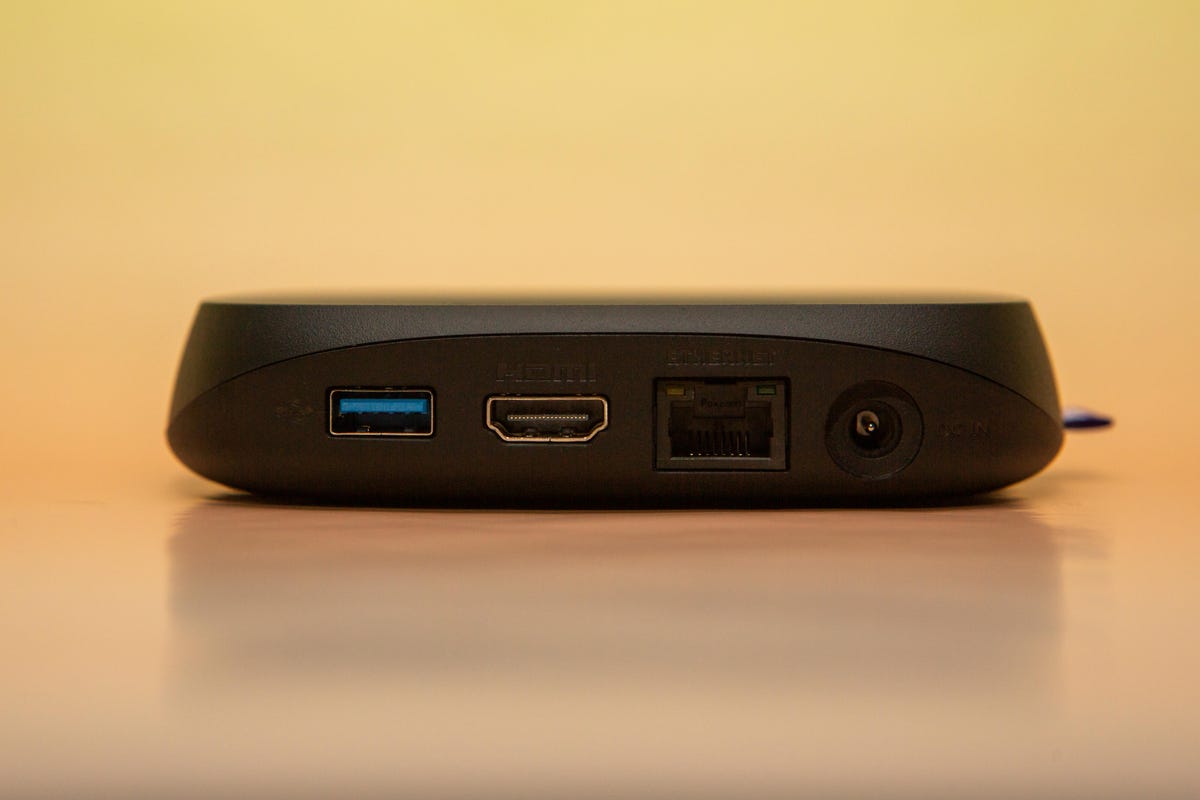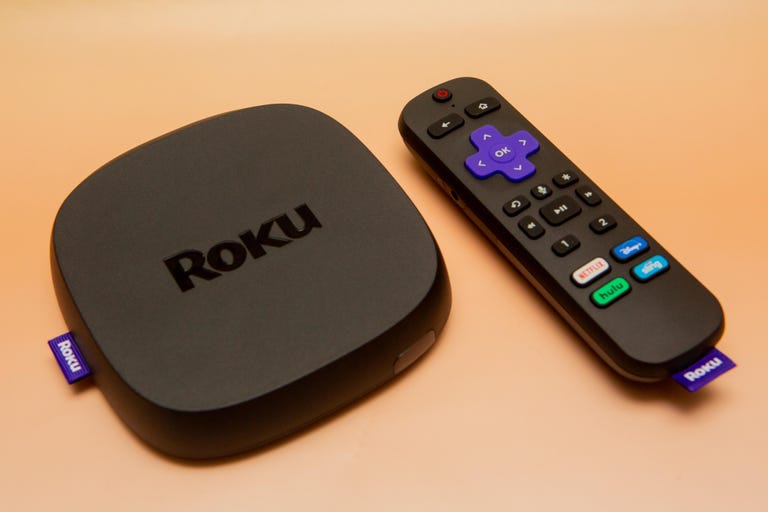 Why You Can Trust CNET
Why You Can Trust CNET Roku Ultra 2020 review: If it ain't broke, don't fix it
Roku's latest flagship box makes a few small tweaks, but it remains a tough sell over the Streaming Stick Plus.
The Roku Ultra has always been a fine 4K HDR streamer. As the flagship in Roku's extensive line of sticks and players, its bag of nifty tricks includes a remote finder, programmable remote buttons and an Ethernet port -- which might be especially welcome now when home Wi-Fi networks are more stressed than ever. For 2020 it adds better Wi-Fi, a faster processor and the ability to stream in Dolby Vision -- a long-awaited feature that allows it to better compete with the best streamers from Amazon, Apple and Google.
Like
- Supports Dolby Vision 4K HDR
- Remote finder is awesome
- Can connect via Ethernet
Don't like
- Twice the price of Streaming Stick Plus
- Weaker voice assistant than Amazon and Google streamers
All of those features are nice additions, making the 2020 Ultra a worthwhile upgrade for those who value the extra conveniences, prefer connecting the device through Ethernet or want Dolby Vision. But its main features, namely access to our favorite streaming platform in 4K HDR, a voice remote that can control a TV and Apple AirPlay support are also available in the Roku Streaming Stick Plus for half as much money. The Roku Ultra doesn't do enough to push the capabilities of what a streaming player can do, making it a tough sell over the Streaming Stick Plus for most people.
Read more: Roku Ultra vs. Apple TV 4K: Battle of the high-end streaming boxes
Small tweaks to a familiar design

The Ultra is the only Roku that can connect to wired Ethernet.
On the surface, Roku made a few changes to the look of the box. Gone is the glossy plastic around the sides, replaced with a new tapered matte-like plastic. Neither design was going to win any awards but the smaller box should still fit fine in a cabinet or on a stand under your TV.
The remote finder button has been moved from its location left of the Roku name on the top of the box to the right side of the device, and the microSD card slot that was present on last year's device has been removed. The USB-A port has also moved from the right-side of last year's Ultra to the back on this year's model.
The DC power is still proprietary, which is also fine but it would've been nice to see USB-C in case you lose the adapter.
The remote still includes the same plastic finish and rubber buttons as other Roku devices, with volume controls on the right side and a 3.5mm headphone jack for private listening on the left. Unlike last year's Ultra, the streaming maker doesn't tout that the included buds are "premium JBL" headphones (they are instead Roku-made ones), but they get the job done.
The Ultra includes headphones that can be plugged into the remote.
There is Bluetooth on the Ultra, but this can only be used for streaming audio from a phone, tablet or computer and not for pairing Bluetooth headphones. I'm not sure how useful the feature is, given how Roku has apps for a number of music services including Pandora, Spotify and Amazon Music, not to mention the YouTube app. Perhaps it could help YouTube Music or Apple Music users who can't connect otherwise to their sound systems.
The remote finder feature remains one of my favorite features about the Ultra and one that I wish every streaming device would incorporate.
The remote also has two programmable shortcut buttons in addition to the Roku preloaded options for Netflix, Disney Plus, Hulu and Sling TV. Just like last year, you can have it set to whatever your last voice command was, such as opening an app like Peacock or ESPN or doing a task like searching for a favorite movie or TV show.
An impressive interface but a weak voice assistant
The remote looks pretty much exactly like it did last year.
As you would expect, Roku's interface works great on the Ultra's quad-core processor. Apps, movies and shows opened quickly and playback looked good for 4K, 4K HDR and regular HD content on my TCL P605 TV, the 2017 version of TCL's impressive 6-Series.
Although you can control the Roku with Google Assistant or Amazon Alexa, neither voice assistant is baked directly into the device, something that becomes much more glaring when comparing it to Amazon and Google's latest devices. Google's new Chromecast with Google TV shines in large part thanks to Assistant, and I really missed the ability to just say "play The Tonight Show" or "go to the World Series" and have the Roku automatically switch to the proper app. Google does this integration well with YouTube TV and Amazon does it with Sling TV.
The Roku interface has remained the same for years.
Roku's voice assistant is also dumb when it comes to knowing when events are happening and couldn't answer basic questions like when the Giants and Eagles game was or what time was the presidential debate. As it already works with both platforms, it would be great to see Roku add support for Alexa or Google Assistant directly into the software in the future.
When it comes to playback, the Ultra is fast when asking for specific titles. Asking the Roku to play Avengers Endgame from the home screen took roughly 35 seconds on my old Roku TV compared to just 18 seconds on the Ultra, which benefits from having faster Wi-Fi chips and a better processor than the 2017 TV (though the Ultra does not include support for the new Wi-Fi 6 standard).
Asking to play The Boys on Amazon Prime video took about 26 seconds on the new Ultra, compared to roughly 39 seconds on my older Roku TV.
Part of the speed on playback could come from those improved Wi-Fi capabilities. Roku touts the new Ultra as having 50% more range compared to last year's model. While I couldn't test that much in my New York apartment, the faster playback of shows and movies compared to my Roku TV bodes well for a performance boost.
One thing that was slow on both the TV and the new Ultra, however, is asking the Roku assistant to do tasks beyond title searches -- from looking up a movie to switching apps. This takes a bit more time than either Alexa or the Google Assistant, with Roku having a default pop-up and seven-second countdown clock just in case you want to stay in the app you are in. I wish there was a way to remove or shorten this countdown but no such option exists in Settings.
Peacock is available on Roku but the platform is still missing HBO Max.
Strong app support with the welcome addition of Dolby Vision and Atmos
As for apps, Roku continues to impress with support for nearly all major streaming services, including finally adding support for HBO Max. Support for Apple AirPlay is also a nice perk and at least allows Apple users to stream the app from iOS and Macs, while screen mirroring remains an option for most Android users.
Streaming service support
| Device | HBO Max | Peacock | Apple TV Plus |
|---|---|---|---|
| Roku | Yes | Yes | Yes |
| Fire TV | Yes | No | Yes |
| Chromecast with Google TV | Yes | Yes | Coming in 2021 |
| Apple TV | Yes | Yes | Yes |
Apps such as Disney Plus support Dolby Vision and Atmos (which makes sense as compatible Roku 4K TVs have had Dolby Vision support for a while). Netflix, Vudu and Apple TV Plus also have shows and movies available in Dolby Vision and Atmos, though there's no easy way to see a full list of which apps work with the premium HDR and sound format.
Lack of support for Dolby Vision was notable on last year's model, so it's nice to see it present here. While my Sonos Beam doesn't support Dolby Atmos, Dolby Vision content seemed to play fine on my TCL. As did regular 4K HDR content including The Boys on Amazon Prime Video and the Kansas City Chiefs versus Buffalo Bills game on the Fox Sports app.
As with other Dolby Vision devices, if your TV supports Dolby Vision all menus and content are recognized by the TV as that standard regardless of whether the actual service, movie or show is in the premium viewing format. This wasn't a problem and non-4K HDR content (such as SportsCenter on Sling TV or YouTube videos) still looked fine.
One more thing about apps: I wish Roku made it easier to upgrade from one player to another. Setting up the Roku is simple, but if you're upgrading from an older device it would be great if the system preloaded your apps and logged you in as opposed to having you go through the process of logging in again. It's a small gripe, but one that should be fixed in 2020.


